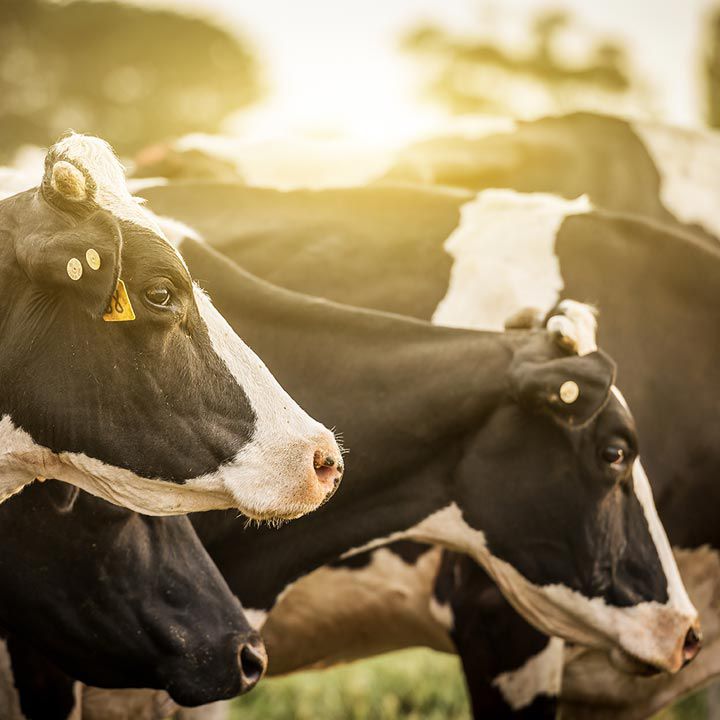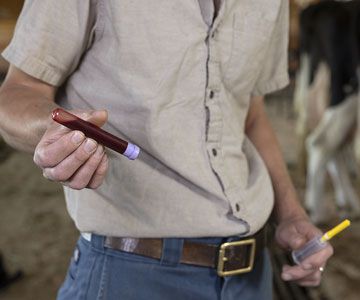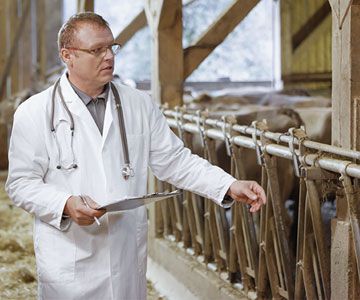
Alertys pregnancy tests
Improve pregnancy testing efficiency, accuracy, and workflow with sample-based tests
- Reduce days empty, increase production, and improve herd health with accurate, fast results.
- Our pregnancy tests are based on the detection of a panel of pregnancy-associated glycoproteins (PAGs), which are only produced in the presence of an embryo or fetus.
- Alertys milk- and blood-based tests offer flexible testing options with results as early as 28 days postbreeding.
- Improve cow comfort, animal welfare, and employee safety
Find the right fit for your operation

For farmers
Find out more about running the cowside Alertys OnFarm Pregnancy test, providing you reliable results in 5-20 minutes. Discover how you can also incorporate the Alertys Milk Pregnancy Test alongside your current herd testing

For genetic companies
Find out more about how you can incorporate the Alertys OnFarm Pregnancy Test into your embro or semen offerings and the opportunity to do 28 day pregnancy testing.

For herd testing centers
Understand the significant benefits of offering the Alertys Milk Pregnancy Test or the Alertys OnFarm Pregnancy Test to your dairy clients who regularly herd record.

For veterinarians
The Alertys OnFarm Test will enhance your pregnancy testing offering through either early or more regular testing using the Alertys OnFarm Pregnancy Test.
What test should I use?
Choose the Alertys test that's right for your herd
Dairy cows and heifers
Choose from the following tests based on your sample preference
Alertys OnFarm
|
Alertys Milk
|
Alertys Ruminant Pregnancy Test |
Alertys Rapid Visual Pregnancy Test |
|
Sample type |
Blood |
Milk |
Blood | Blood |
Testing location |
On farm | Laboratory | Laboratory |
On farm Through your veterinarian |
Part numbers |
98-26441-00 (25 tests) | 99-41209 (5/strip) 99-41519 (30/strip) |
99-41169 (5/strip) | 99-41369 (2/strip) |
Beef cattle (and replacement dairy heifers)
Choose from the following tests based on your sample preference
Alertys OnFarm Pregnancy Test |
Alertys Ruminant Pregnancy Test |
Alertys Rapid Visual Pregnancy Test |
|
Sample type |
Blood | Blood | Blood |
Testing location |
On farm | Laboratory |
On farm Through your veterinarian
|
Part numbers |
98-26441-00 (25 tests) | 99-41169 (5/strip) | 99-41369 (2/strip) |
Sheep, goats, and water buffalo
Choose from the following tests based on your sample preference
Alertys Milk Pregnancy Test |
Alertys Ruminant Pregnancy Test |
Alertys Rapid Visual Pregnancy Test |
|
Sample type |
Milk |
Blood | Blood |
Testing location |
Laboratory | Laboratory |
On farm Through your veterinarian |
Part numbers |
99-41209 (5/strip) 99-41519 (30/strip) |
99-41169 (5/strip) | 99-41369 (2/strip) |
Bison
Choose from the following tests based on your sample preference
Alertys Ruminant Pregnancy Test |
|
Sample type |
Blood |
Testing location |
Laboratory |
Part numbers |
99-41169 (5/strip) |
When to test your herd
Initial pregnancy diagnosis |
|
Throughout gestation to confirm pregnancy status |
|
Pregnancy confirmation prior to dry off |
|
Why use sample-based testing?
An easier way of pregnancy testing using a sample of milk or blood to know if your cows or heifers are pregnant.
Alertys pregnancy tests use blood and milk samples to detect pregnancy-associated glycoproteins (PAGs), which are only produced in the presence of an embryo or fetus.
Complete list of species, sample types, and sensitivity for Alertys pregnancy tests
Assess overall herd health
An open pregnancy result can suggest the presence of disease.
Protect your herd from diseases shown to impact pregnancy rates, including Johne's disease, Neospora caninum, bovine viral diarrhea virus (BVDV), infectious bovine rhinotracheitis (IBR), and brucellosis.
Find out if Alertys pregnancy testing is right for your farm
Frequently asked questions
- Label tube prior to sampling. Include date and individual cow ID. It is essential to ensure that the correct tube is used for the correct animal. Failure to do so may result in an incorrect status being assigned to the cow.
- Using the wet wipes or towel, remove dirt and detritus from the teats. Ensure udder is clean and dry prior to starting sample collection.
- Samples may be taken from individual quarters or as a composite sample of all four quarters.
- Discard a few streams of milk and remove the cap from the tube or vial. Angle tube at 45º to the teat end.
- Fill the tube or vial three-quarters full from one or multiple quarters and replace the cap.
- Place samples in a refrigerator prior to shipping to the laboratory.
- Samples should be well-packaged and kept cool during shipping (especially if preservative has not been used).
- Label tube prior to sampling, include date and individual cow ID. It is essential to ensure that the correct tube is used for the correct animal. Failure to do so may result in an incorrect status being assigned to the cow.
- Restrain the cow; clean the underside of the cow’s tail with a paper towel.
- Lift the cow’s tail straight up and measure up about 2 inches (7.5 cm) from the base of the tail, staying within the groove between the two bony ridges. This is the collection site.
- Insert the external needle into the underside of the tail, at the collection site, about 1/2 inch deep, keeping the needle perpendicular to the tail.
IMPORTANT: The external needle must be perpendicular to the tail. Do not angle the needle up, down, or to the side. - Push the tube in gently until the internal needle punctures the tube stopper. The vacuum will draw the blood into the tube. Note: If no blood appears, pull the external needle back slightly (without withdrawing it from the skin), and reinsert it in a different direction until you puncture the vein.
- When the tube is at least half full, withdraw the needle from the vein and remove the tube from the needle holder.
- Discard the needle and yellow/gray caps into a sharps container. The needle holder can be reused if undamaged.
- Make sure the tube label is clean and dry; label the tube with the sample number and the cow ID.
There are several options depending on which Alertys product you would like to utilize. Alertys pregnancy tests are available to producers,through herd testing laboratories and genetic companies. If you are unsure of which option works best for your operation, contact an IDEXX Representative near you.
Most test kits require a sample tube for blood or milk collection. For the Alertys OnFarm Pregnancy Test, we recommend a EDTA tube for whole blood samples, which you can order through your local distributor.